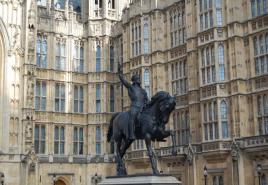Brief description of the course umk perspective. Umk, or educational-methodical complexes for primary school
He could become one of the greatest monarchs in russian history, but fate decreed otherwise. The abolition of parochialism, a general census of the population, the introduction of household taxation - the most important reforms of his short reign, in terms of their significance and topicality, are on a par with the great transformations of his younger brother, Emperor Peter.
One of the initiators of the creation of the Slavic-Greek-Latin Academy, a pupil of Simeon of Polotsk, poet, musician, “philosopher on the throne” - Tsar Fyodor Alekseevich - passed away on that day, 335 years ago.
The sudden death of the 20-year-old childless monarch gave rise to an active struggle for power between the Naryshkins and Miloslavsky clans, relatives of both wives of Tsar Alexei Mikhailovich. As a result, after the bloody events of the Strelets Riot, a compromise was reached. The brothers of the late Fyodor Alekseevich - John and Peter - ascended the throne under the regency of their sister, Princess Sophia.
Fedor Alekseevich 1661 - 1682
275 years ago, on May 7, 1742, celebrations of the coronation of Empress Elizaveta Petrovna were held in Moscow.
"The most legitimate of all the successors and successors of Peter the Great, but raised to the throne by rebellious guards bayonets, she inherited the energy of her great father," wrote the historian Klyuchevsky. “Raised among the new European trends and traditions of pious Russian antiquity, she managed to combine the concepts and tastes of these opposite trends.”
Elizaveta Petrovna 1742
“Do you want your songs not to die? Then sing about the heart of a man, ”he said. “Love is the energy of life. Destroy love - and our land will turn into a grave. "
He drew his inspiration from numerous trips to Europe. In his diary, he wrote: "Italy replaced Oxford for me, and travel - all faculties."
May 7 marks the 205th birthday of the English poet Robert Browning.
He was not very popular with his contemporaries, who considered his style of writing too difficult to understand, and the images he created were too vague and confusing. However, as an acclaimed master of dramatic monologue, Browning took one of the most honorable places in the pantheon of Victorian literature.
Robert Browning 1812 - 1889
Vladislav Reymont was born on this day exactly 150 years ago. Polish writer, author of short stories, novellas, novels and poems, whose work combines the traditions of critical realism with elements of naturalism and symbolism.
The main creation of Reymont is considered the novel "The Men", which depicts the rural life of Poland in class contradictions and psychological conflicts. For this work, as for "outstanding national epic", the writer was awarded Nobel Prize on literature in 1924.
As noted by a member of the Swedish Academy Per Hallström, the novel "The Men" "was written with such skill, with such a confident hand, that one can easily predict its long life in literature."
Vladislav Reymont 1867 - 1925
90 years ago on this day, Ruth Praver Jabwala was born - British and American writer, screenwriter. Winner of the Booker Prize and two-time Oscar winner for the best screenplay adapted to screen adaptations of the English novelist Edward Forster's Room with a View and Howards End. The only person in the world to be awarded both an Oscar and a Booker.
Ruth Praver Jabwala 1927 - 2013
On May 7, 1895, the Russian physicist Alexander Popov demonstrated a radio communication session. For the first time this date was solemnly celebrated in the USSR in 1925, and since 1945 the holiday has been celebrated annually.
Radio day
Empress Elizabeth
Empress Elizabeth reigned for twenty years, from November 25, 1741 to December 25, 1761. Her reign was not without glory, not even without benefit. Her youth was not edifying. The princess could not bear neither strict rules nor pleasant memories from the homeless second family of Peter, where the first words that the child learned to pronounce were daddy, mommy, soldier, and the mother was in a hurry to get her daughters in marriage as soon as possible, so that in the event of their father's death, they would not have rivals in the throne. Growing up, Elizabeth seemed like a young lady who was brought up in a girl's. All her life she didn’t want to know when to get up, dress, dine, go to bed. Servants' weddings brought her great amusement: she herself cleaned the bride to the crown and then, from behind the door, admired how the wedding guests were having fun. In her address, she was either too simple and affectionate, then she lost her temper out of trifles and scolded, whoever came across, a footman or a courtier, in the most unfortunate words, and the ladies-in-waiting got even more painful. Elizabeth fell between two opposite cultural currents, was brought up among the new European trends and traditions of pious patriotic antiquity. Both influences left their imprint on her, and she knew how to combine the concepts and tastes of both: from Vespers she went to the ball, and from the ball she kept pace with Matins, reverently honored the relics and rituals of the Russian Church, subscribed from Paris descriptions of Versailles court banquets and festivals, she was passionately fond of French performances and knew all the gastronomic secrets of Russian cuisine to the subtlety. The obedient daughter of her confessor, Fr. Dubyansky and a student of the French dancemaster Rambour, she strictly observed fasts at her court, so that gastronomic chancellor A.P. Bestuzhev-Ryumin was allowed not to eat mushrooms only with the permission of the Patriarch of Constantinople, and in the whole empire no one better than the empress could perform the minuet and the Russian dancing. The religious mood was warmed in her by an aesthetic feeling. The bride of all kinds of suitors in the world, from the French king to her own nephew, under Empress Anna, saved by Biron from the monastery and the ducal Saxe-Coburgmeiningen slum, she gave her heart to the court choir from the Chernihiv Cossacks, and the palace turned into a musical house: Little Russian singers were also registered Italian singers, so as not to disturb the integrity of the artistic impression, they both sang together both mass and opera. The duality of educational influences explains the pleasant or unexpected contradictions in the character and way of life of Elizabeth. Lively and cheerful, but not taking her eyes off herself, at the same time large and slender, with a beautiful round and eternally blooming face, she loved to impress, and, knowing that a man's suit especially suits her, she installed masquerades at court without masks where men were required to come in full women's dress, in extensive skirts, and ladies in men's court dress. The most legitimate of all the successors and successors of Peter I, but raised to the throne by rebellious guards bayonets, she inherited the energy of her father, built palaces at twenty-four hours and in two days traveled the then way from Moscow to St. Petersburg, regularly paying for every driven horse. Peaceful and carefree, she was forced to fight almost half of her reign, defeated the first strategist of that time, Frederick the Great, took Berlin, laid the abyss of soldiers in the fields of Zorndorf and Kunersdorf; but since the reign of Tsarevna Sophia, life in Russia has never been so easy, and no reign until 1762 left such a pleasant memory. In two large coalition wars that exhausted Western Europeit seemed that Elizabeth with her 300,000-strong army could become the ruler of European destinies; the map of Europe lay in front of her at her disposal, but she so rarely looked at it that until the end of her life she was sure of the possibility of traveling to England by dry road - and she also founded the first real university in Russia - Moscow. Lazy and capricious, frightened by any serious thought, abhorrent to any business occupation, Elizabeth could not enter difficult international relationships Europe and understand the diplomatic intricacies of its chancellor Bestuzhev-Ryumin. But in her inner chambers, she created a special political environment for herself, consisting of hangers-on and storytellers, gossips, at the head of which was an intimate solidary cabinet, where the prime minister was Mavra Yegorovna Shuvalova, the wife of an inventor and projector known to us, and members were Anna Karlovna Vorontsova, nee Skavronskaya, a relative of the empress, and some simply Elizaveta Ivanovna, who was called the Minister of Foreign Affairs: “All the cases were submitted through her to the empress,” notes a contemporary. The subjects of the study in this office were tales, gossip, talk, all sorts of tricks and persecution of courtiers against each other, which gave Elizabeth great pleasure. These were the "spheres" of that time; from here important ranks and places of bread were distributed; major government affairs were carried out here. These armchair classes alternated with festivities. From a young age, Elizabeth was dreamy and, being the Grand Duchess, once in a charming oblivion, she signed a business paper instead of her name with the words Flame ... Having ascended the throne, she wanted to fulfill her girlish dreams into a magical reality; an endless string of performances, entertainment trips, kurtags, balls, masquerades, striking with dazzling brilliance and luxury to the point of nausea. Sometimes the whole courtyard turned into a theatrical foyer: from day to day they talked only about French comedy, about the Italian comic opera and its maintainer Locatelli, about intermezzi, etc. furnishings, untidiness: the doors were not closed, the window was blowing; water flowed over the wall paneling, the rooms were extremely damp; in Grand Duchess Catherine's bedroom huge cracks were gaping in the oven; 17 servants were crowded in a small cell near this bedroom; the furnishings were so meager that mirrors, beds, tables and chairs were transported from palace to palace, even from St. Petersburg to Moscow, as needed, broken, beaten, and in this form were placed in temporary places. Elizabeth lived and reigned in gilded poverty; she left behind in her wardrobe with over 15 thousand dresses, two chests of silk stockings, a bunch of unpaid bills and an unfinished huge Winter Palace, which had already absorbed from 1755 to 1761 more than 10 million rubles in our money. Not long before her death, she really wanted to live in this palace; but she was in vain to have the builder Rastrelli hurry to decorate at least her own living rooms. French haberdashery shops sometimes refused to issue new-fangled goods to the palace on credit. For all that, in her, not like in her Courland predecessor, somewhere deep there, deep under a thick crust of prejudices, bad habits and spoiled tastes, there was still a man who sometimes burst out in a vow before seizing the throne not to execute anyone with death and in fulfilling this vow the decree of May 17, 1744, which actually abolished the death penalty in Russia, then in the non-approval of the fierce criminal part of the Code, drawn up in the Commission of 1754 and already approved by the Senate, with refined types of the death penalty, then in the prevention of obscene petitions from the Synod about the need to abandon this empress of the vow, then, finally, in the ability to cry from an unjust decision, torn out by the intrigues of the same Synod. Elizabeth was an intelligent and kind, but disorderly and wayward Russian lady of the 18th century, whom, according to Russian custom, many scolded during her lifetime and, according to Russian custom, everyone mourned over her death.
The most legitimate of all the successors and successors of Peter I, but raised to the throne by rebellious guards bayonets, she inherited the energy of her great father, built palaces at twenty-four hours and in two days traveled the then way from Moscow to St. Petersburg, regularly paying for every driven horse. Peaceful and carefree, she was forced to fight almost half of her reign, defeated the first strategist of that time, Frederick the Great, took Berlin, laid the abyss of soldiers in the fields of Zorndorf and Kunersdorf; but since the reign of Tsarevna Sophia, life in Russia has never been so easy, and no reign until 1762 left such a pleasant memory. With two large coalition wars that exhausted Western Europe, it seemed that Elizabeth with her 300,000-strong army could become the ruler of European destinies; the map of Europe lay in front of her at her disposal, but she so rarely looked at it that until the end of her life she was sure of the possibility of traveling to England by dry road; and she also founded the first real university in Russia - Moscow. Lazy and capricious, frightened by any serious thought, abhorrent to any business occupation, Elizabeth could not enter the complex international relations of the then Europe and understand the diplomatic intricacies of her chancellor Bestuzhev-Ryumin. But in her inner chambers, she created a special political environment for herself, consisting of hangers-on and storytellers, gossips, at the head of which was an intimate solidary cabinet, where the prime minister was Mavra Yegorovna Shuvalova, the wife of an inventor and projector known to us, and members were Anna Karlovna Vorontsova, nee Skavronskaya, a relative of the empress, and some kind of just Elizabeth Ivanovna, who was called the Minister of Foreign Affairs. "All the cases were submitted to the empress through her," notes a contemporary. The subjects of the study in this office were tales, gossip, talk, all sorts of tricks and persecution of courtiers against each other, which gave Elizabeth great pleasure. These were the "spheres" of that time; from here important ranks and places of bread were distributed; major government affairs were carried out here. These armchair classes alternated with festivities. From her youth, Elizabeth was dreamy and, while still being the Grand Duchess, once, in a spell of oblivion, she signed a business paper instead of her name with the words Fire of Fire ... Having ascended the throne, she wanted to fulfill her girlish dreams into a magical reality; an endless string of performances, entertainment trips, kurtags, balls, masquerades, striking with dazzling brilliance and luxury to the point of nausea. Sometimes the entire courtyard turned into a theatrical foyer: from day to day they talked only about French comedy, about the Italian comic opera and its maintainer Locatelli, about intermezzi, etc. furnishings, untidiness: the doors were not closed, the window was blowing; water flowed over the wall paneling, the rooms were extremely damp; in the bedroom of Grand Duchess Catherine there were huge slits in the oven; 17 servants were crowded in a small cell near this bedroom; the furnishings were so scarce that mirrors, beds, tables and chairs were transported from palace to palace, even from St. Petersburg to Moscow, as needed, broken, beaten, and in this form were placed in temporary places. Elizabeth lived and reigned in gilded poverty; she left behind in her wardrobe too 15 thousand dresses, two chests of silk stockings, a bunch of unpaid bills and the huge unfinished Winter Palace, which had already absorbed from 1755 to 1761 more than 10 million rubles in our money.







